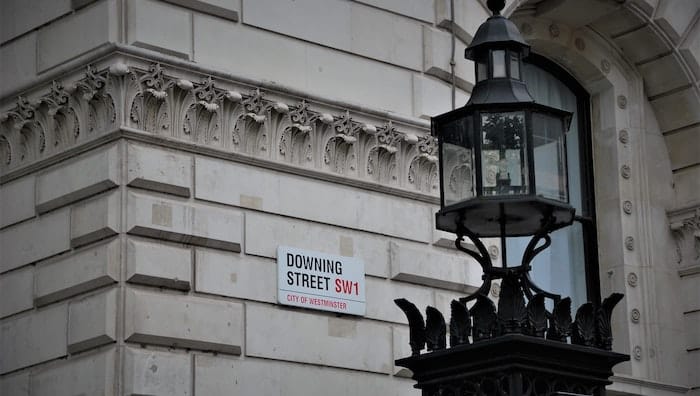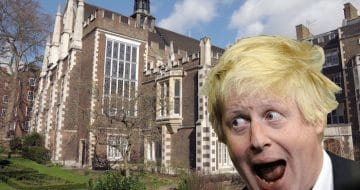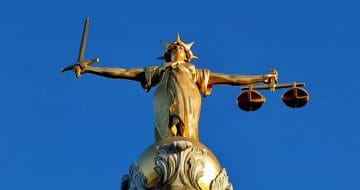Lawyer-bashing long a staple of No.10 rhetoric

The legal profession has pushed back strongly after the Johnson government criticised the work of lawyers.
Wait, haven’t we heard this one before?
Last night’s Bar Council and Law Society statement calling on the PM to “stop attacks on legal professionals” helping refugees fight removal to Rwanda seems to have been issued more in hope than expectation. The cycle of lawyer-bashing followed by condemnation is pretty familiar.
1. ‘Activist lawyers’
In September 2020, stung by criticism of her department’s inability to stop asylum seekers crossing the English Channel by boat, Home Secretary Priti Patel claimed the problem was that “removals continue to be frustrated by activist lawyers”. A Bar Council tweet hitting back went viral.
A few days later, immigration law firm Duncan Lewis was attacked by an alleged right-wing extremist. Cavan Medlock, from Harrow in London, allegedly blamed lawyers at the firm for preventing the removal of immigrants from the UK, the Guardian reported at the time.
Medlock pleaded guilty to four offences including “threatening the receptionist with a knife“. He denies planning to kill a senior solicitor at the firm; a trial is reportedly listed for next month.
2. ‘Lefty human rights lawyers’
Johnson soon waded in, adopting Patel’s criticism of immigration lawyers to take aim at their colleagues in criminal. Speaking to the Conservative Party conference in October 2020, the PM said that the criminal justice system was being “hamstrung by what the Home Secretary would doubtless and rightly call the lefty human rights lawyers and other do-gooders”.
The Law Society of England and Wales called his speech “deeply concerning”; the Bar Council went for “shocking and troubling”.
So, this week I had to put extra security in our offices directly as a result of the government attacks on lawyers which makes us vulnerable to physical attacks from right wing extremists. I don’t think that this is a sentence that a lawyer should have to write in a democracy.
— Polly Glynn (@PollyGlynn1) October 23, 2020
3. ‘Left-wing criminal justice lawyers’
The PM returned to this theme a year later, telling LBC’s Nick Ferrari:
“When you look at Labour, you see a party that voted consistently against tougher sentences for serious sexual violent offenders. The Labour opposition has consistently taken the side of, I’m afraid, left-wing criminal justice lawyers against, I believe, the interests of the public.”
Roddy Dunlop QC, head of the Scottish bar, said: “These attacks on the profession must stop.”
Sad to see unfounded ‘left-wing criminal justice lawyer’ comments from the Prime Minister. Criminal lawyers, designated key workers by the government, act independently, prosecuting on behalf of the public or defending members of the public – in the public interest. https://t.co/1dap7zPGPM
— Chair of the Bar Council (@BarCouncilChair) July 28, 2021
4. ‘Liberal left lawyers’
The government has always known that its plan to give asylum seekers a one-way ticket to Rwanda would be both politically and legally controversial. The agreement signed with the Rwandan government even mentions adverse court decisions. Speaking during the local election campaign earlier this year, Johnson declared that the inevitable legal challenges were ideologically motivated: “yes, of course there are going to be legal eagles, liberal left lawyers who will try to make this difficult.”
This time, Law Society president I. Stephanie Boyce replied: “It is misleading and dangerous for the prime minister to name-call lawyers who are doing their job and upholding the law.”
5. ‘Abetting the work of the criminal gangs’
Which brings us to this week, when the first planned flight to Rwanda was halted by the courts. Supreme Court President Lord Reed noted in one such case: “the appellant’s lawyers were performing their proper function of ensuring that their clients are not subjected to unlawful treatment at the hands of the Government.”
Johnson invited cameras into the Cabinet room to complain that the Rwanda plan was “under a huge amount of attack, not least from lawyers who are finding ways to unpick it”.
He quickly added: “I love lawyers, many of the people around this table are lawyers.”
But he went on to say that those opposed to the Rwanda policy were “abetting the work of the criminal gangs” involved in taking people across the Channel. Dunlop QC said that this “has unsurprisingly been widely understood as referring to the legal profession”, and (again) called for such attacks to stop.
In a joint statement, “the Bar Council and Law Society of England and Wales together call on the Prime Minister to stop attacks on legal professionals who are simply doing their jobs”.
Don’t hold your breath.


